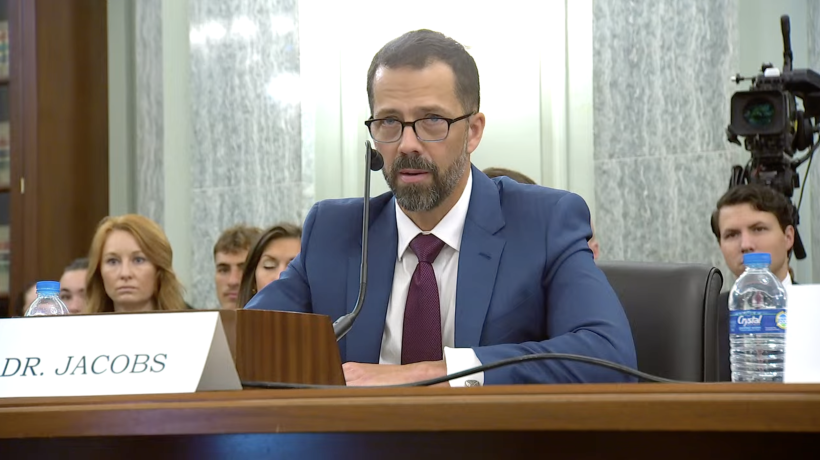Senators Press NOAA Nominees on Budget and Staffing Cuts

Neil Jacobs testifies at his Senate nomination hearing on July 9, 2025.
Senate Commerce, Science, and Transportation Committee
Neil Jacobs, President Donald Trump’s pick to lead the National Oceanic and Atmospheric Administration, told senators this week that he wants to improve NOAA’s technology and make the U.S. “the world’s leader in global weather forecast modeling.”
The Senate Commerce, Science, and Transportation Committee held a hearing
The Trump administration has proposed a 27% budget cut
Jacobs said he supported the president’s budget, but also that “I don’t know that you could spend too much on research.”
Asked by Sen. Ed Markey (D-MA) if the proposed cuts will “improve the weather readiness” of the U.S., Jacobs said, “The cuts you’re referring to, a lot of that work is being transitioned in from the research side to the operation side. Essential functions will continue.”
“I have a disagreement with you,” Markey replied. “A 27% cut is going to have an impact.”
Pressed by Ranking Member Maria Cantwell (D-WA) on whether he supports the budget request’s proposal to cut research programs under OAR, Jordan similarly argued that “it looks like the transition of some of that work is happening from OAR to the Weather Service.”
“I think we’re in a disagreement on this,” Cantwell replied, adding that she believes OAR is “key” to NOAA’s overall mission.
The president’s budget request calls for roughly a quarter of OAR’s budget to be transferred to the National Weather Service and National Ocean Service. The majority of OAR’s portfolio would be cut outright.
Later in the hearing, Jordan argued that closing OAR and moving its responsibilities to the National Weather Service and National Ocean Service would help address concerns brought up by Committee Chair Ted Cruz (R-TX) about the “siloed structure” of NOAA line offices leading to “research projects stalling or never transitioning into operational use.”
“The closeness with the operational end user, the outcome of that data will foster greater collaboration and innovation, and you also get that feedback loop of research to operations, operations to research,” Jordan said.
Texas floods loom large
The deadly flash floods in Texas in recent weeks dominated the hearing and drove a focus on weather warning systems. Senators, especially Cruz, frequently focused their questioning on NOAA’s communications systems and how they might be made more efficient and easily accessible to the American people.
In his opening statement, Cruz said, “One question we will certainly be asking in Texas, and we ought to be asking across the country, is, ‘How can we improve the speed and rate of response when an extreme weather warning goes out?’”
Jacobs said that, if confirmed, one of his main focuses would be improving weather forecasts, especially their delivery mechanisms.
“Even if you have a perfect forecast, if you can’t get the information to the people, it’s totally useless,” he said.
Jacobs said he wants to upgrade NOAA’s technology, saying he would push the agency to use AI more and develop its supercomputing resources. “Even if the AI can’t do something better, if it can do it faster and more efficiently, I think it’s worth using,” he said. He also suggested increasing the agency’s use of cloud computing, expanding its satellite systems to combat fishery poaching, and modernizing weather radio.
Jacobs also said that staffing the National Weather Service’s offices is one of his top priorities, despite the federal hiring freeze. He said he believes it is important to have a full staff at the regional level, as they have relationships with people in the community.
Sen. Amy Klobuchar (D-MN) said NOAA has fired close to 2,000 employees since the start of this year and now has over 3,000 vacant staff positions.
Senators raise scientific integrity questions
Jacobs served as acting NOAA administrator in the first Trump administration during the scientific integrity controversy that erupted concerning the forecast of Hurricane Dorian. An investigation
When asked by Sen. Ben Ray Luján (D-NM) if he would sign off on an inaccurate statement due to political pressure in the future, Jacobs answered “no.”
This is not the first time Jacobs has fielded questions from Congress about this incident. At a House Science Committee hearing


